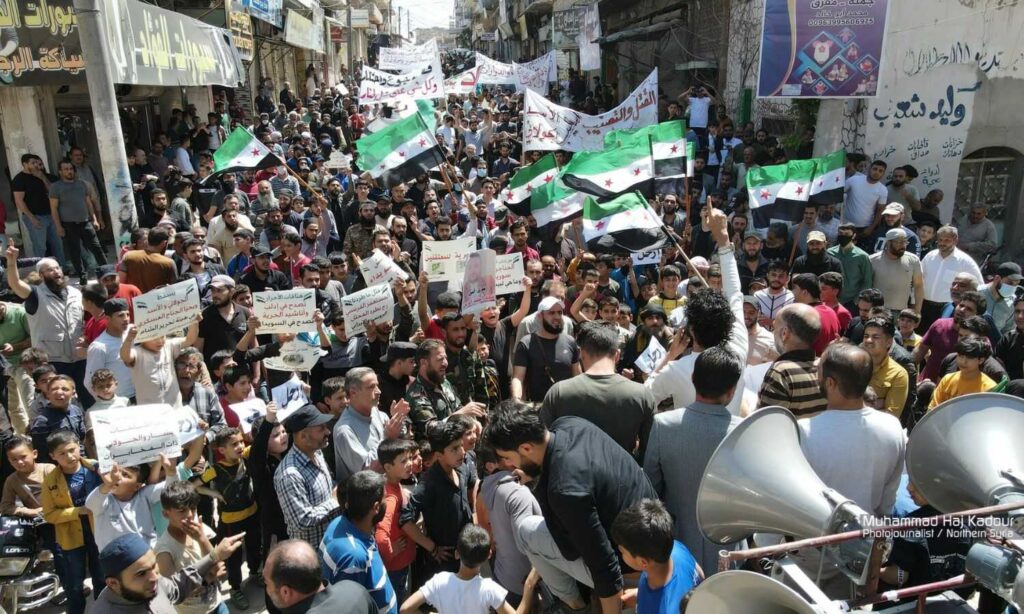Today, activists in Idlib, northwest Syria, were subjected to assaults concurrent with the protests in the region, calling for the downfall of the leader of Hayat Tahrir al-Sham (HTS), Abu Mohammad al-Jolani.
Today, Friday, April 19, separate demonstrations took place in central Idlib, Atmeh, Jisr al-Shughour, al-Atareb, Hazano, and Binnish calling for the fall of al-Jolani and rejecting the monopolization of decision-making.
According to local reports, an injured activist, Sharif (Abu Abd al-Hadi al-Halabi) who participated in the current demonstrations, was intercepted by individuals from the city of Sarmada, north of Idlib. They smashed his car, beat him with their hands, and one of them stabbed him with a knife, following a previous dispute that was reportedly due to some Sarmada locals slandering after a problem with them.
On his part, the Sarmada police chief, Tahir al-Omar, stated that a brawl occurred between demonstrators and civilians in Sarmada, resulting in one injury. Following that, police patrols headed to the location and organized the necessary proceedings, while the search still continues for the parties involved in the brawl, to arrest them and present them to the judiciary, as reported by the Ministry of Interior in the Syrian Salvation Government (SSG).
Independent preacher Abdul Razzaq al-Mahdi commented via Telegram, “We have repeatedly mentioned that it is not permissible to attack peaceful, disciplined demonstrations; what happened to brother Sharif Abu Abd al-Hadi in terms of stabbing and beating is forbidden and not permissible.”
Additionally, active Telegram rooms in the north circulated a videotaped statement claiming to represent the revolutionary movement in Idlib, which stated, “We are a group of people from Aleppo for the revolutionary movement, we call on our free people in all regions to protest stands to reject this criminal attack that was faced by one of the sons of this blessed movement, and we call for protest stands tomorrow with the time to be agreed upon.”
Moreover, the car of media activist Mufeed Obeido was attacked, and the camera and media equipment were stolen. The activist published a video recording showing the condition of the car after the attack.
Demonstrations and promises
Since February 26, Hayat Tahrir al-Sham has been facing a peaceful movement and demonstrations from civilians, activists, military personnel, and religious scholars demanding the overthrow of al-Jolani, and rejecting the monopoly of decision-making and domination of power.
The spark of the demonstrations was torture operations in HTS prisons, and a case of a military faction member being killed and his fate concealed (later revealed) at the hands of Tahrir al-Sham.
The demonstrations were met with promises, reforms, and intensive meetings by al-Jolani and the officials of the Salvation Government and Shura Council, including a general amnesty for detainees with conditions and exceptions, forming committees to listen to the locals, eliminating fees on buildings and exempting part of them under conditions.
Following these, a package of promises was made, and work began on their implementation, involving the reformation of the General Security Services within the Ministry of Interior in the Salvation Government, forming a higher advisory council to review general policies and strategic decisions in the region, calling for elections for the General Shura Council in the region, the establishment of the Grievances and Accountability Bureau, the formation of a higher supervisory body, reevaluating economic policies, combating corruption, preventing monopolies, and activating the role of local councils and professional associations.

